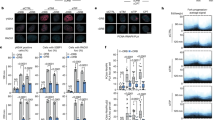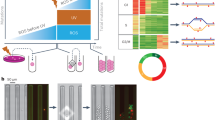Abstract
The DG75 Burkitt lymphoma-derived human B cell line is heterozygous for p53, carrying wild type (WT) and mutant (Arg283His) alleles. The cells constitutively express high levels of both p53 proteins and also Mdm2. Arg283His transactivates the p21Waf1, Mdm2, bax, cyclin G and IGF-BP3 promoters in transient transfection assays equally as well as, if not better than WT p53. It also suppresses the outgrowth of SAOS-2 cells and specifically binds DNA like wild type protein. However, in primary rodent fibroblasts Arg283His fails to suppress transformation by HPV16-E7 and (Ha-)ras and even has modest transforming activity when transfected alone with (Ha-)ras. When Arg283His is transiently transfected into SAOS-2 cells it efficiently induces apoptosis, so – unlike mutants such as Arg175Pro – its behaviour in transformation assays does not clearly correlate with loss of the apoptosis function. Immunofluorescence staining of both REF transformants and transiently transfected SAOS-2 revealed that this unusual mutant becomes excluded from the nucleus and produces striking cytoplasmic fluorescence. The best correlation with transformation, therefore, appears to be the lack of nuclear retention of Arg283His. Since this mutation does not map to any known nuclear localization signal and its presence seems to result in aberrant exclusion from the nucleus, then it may prove very useful in exploring mechanisms involved in the nuclear : cytoplasmic shuttling of p53.
This is a preview of subscription content, access via your institution
Access options
Subscribe to this journal
Receive 50 print issues and online access
$259.00 per year
only $5.18 per issue
Buy this article
- Purchase on Springer Link
- Instant access to full article PDF
Prices may be subject to local taxes which are calculated during checkout
Similar content being viewed by others
Author information
Authors and Affiliations
Rights and permissions
About this article
Cite this article
Crook, T., Parker, G., Rozycka, M. et al. A transforming p53 mutant, which binds DNA, transactivates and induces apoptosis reveals a nuclear:cytoplasmic shuttling defect. Oncogene 16, 1429–1441 (1998). https://doi.org/10.1038/sj.onc.1201699
Received:
Revised:
Accepted:
Published:
Issue Date:
DOI: https://doi.org/10.1038/sj.onc.1201699
Keywords
This article is cited by
-
Remodeling of the epitope repertoire of a candidate idiotype vaccine by targeting to lysosomal degradation in dendritic cells
Cancer Immunology, Immunotherapy (2012)
-
Antiviral agent Cidofovir restores p53 function and enhances the radiosensitivity in HPV-associated cancers
Oncogene (2002)
-
Epstein-Barr virus EBNA3C can disrupt multiple cell cycle checkpoints and induce nuclear division divorced from cytokinesis
Oncogene (2000)
-
p53 regulation by post-translational modification and nuclear retention in response to diverse stresses
Oncogene (1999)
-
Novel p53 mutants selected in BRCA-associated tumours which dissociate transformation suppression from other wild-type p53 functions
Oncogene (1999)



